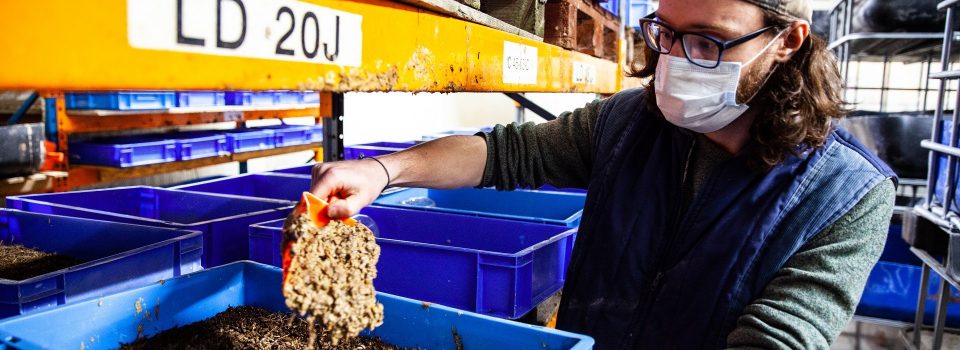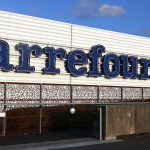- Total demand for insect meal from the UK’s pig, poultry and salmon sectors could reach around 540,000 tonnes a year by 2050
- Replacing soy with viable alternative feeds could help protect important ecosystems like the Brazilian Cerrado
- WWF and Tesco call on UK policy makers and industry to act urgently to scale up use of alternatives to soy and support a circular feed system
A new report published today [1 July] states using insect meal to feed fish and livestock could cut the UK’s future soy footprint by a fifth, protecting critical landscapes like the Brazilian Cerrado. The research, commissioned by WWF in partnership with Tesco, highlights the huge potential for insect farming in helping to tackle the climate and nature crisis.
‘The Future of Feed: a WWF roadmap to accelerating insect protein in UK feeds’ projects the total demand for insect meal from the UK’s pig, poultry and salmon sectors could reach around 540,000 tonnes a year by 2050. This could result in about 16,000 tonnes of fishmeal and 524,000 tonnes of soy being replaced – equivalent to one fifth of the UK’s projected soy imports in 2050, or Tesco UK’s entire 2018 soy footprint. Around 150,000 hectares of land is required to produce this amount of soy annually, almost the size of Greater London.
Animal feed accounts for around 75% of soy production, but cultivation of the crop is fuelling climate change, deforestation and habitat conversion in several key ecosystems, including the Brazillian Cerrado, where more than 100,000 hectares of precious habitat is lost each year to make way for soy production.
In addition to reducing deforestation risk, insect farming has the advantage that many insects are biological waste processors, helping to recycle and decompose material. They can be reared from a vast range of feedstocks, or substrates, and can process surplus food, by-products and other raw materials which might otherwise go to waste.
Currently, processed insect protein cannot be fed to any farmed livestock intended for human consumption. The EU is expected to amend legislation to permit its use in pig and poultry feed, and the UK could follow suit. Even though the use of insect meal is permitted within aquaculture, the volumes are currently too low and so prices are high, preventing significant uptake.
This new research suggests around 240,000 tonnes of insect meal per year could potentially be sourced from UK insect farms. But the growth of the industry in the UK is lagging behind mainland Europe and North America. Some new UK facilities are in construction, but the sector is constrained by several factors, including only a limited number of substrates being authorised for rearing insects which are intended to be used in animal feed.
WWF and Tesco are calling on the UK government to mandate the Food Standards Agency, with input from Food Standards Scotland, to research the potential and regulatory requirements for using additional substrates for insect farming, which could allow a broader range of feedstocks to be used to farm insects.
Tesco is also urging the government to develop financial incentives to support innovative farming methods, such as insect farming, which will support the scale up of these new industries. WWF calls for aquaculture suppliers and retailers to work together to increase demand for insect meal, supporting the move away from a feed system that drives the destruction of nature.
Mike Barrett, Executive Director of Science and Conservation, at WWF said:
“Livestock plays a crucial role in the global food system but producing feed for the 80 billion animals reared for human consumption each year is putting immense pressure on our planet’s resources. With nature in freefall and our climate in crisis, it’s vital that the food we eat here in the UK isn’t driving deforestation overseas.
“We encourage the UK government and retail industry to take urgent action to get environmentally damaging practices out of our supply chains and off our shelves. This includes scaling up the use of alternative proteins such as insect meal and supporting calls for a circular feed system here in the UK.”
Ashwin Prasad, Chief Product Officer, at Tesco said:
“The development of alternative animal feeds like insect meal is vital in tackling the environmental impact of food production. Retailers like Tesco and the food industry as a whole have a key role to play in scaling up the use of insect feed, and we’re already trialling its use in our aquaculture supply chain.
“We’re calling on Government to build on this report and develop financial incentives to support innovative farming methods, such as insect farming, which will support the scale up of these new industries.”
ENDS
The full report is available here. The research was commissioned by WWF-UK and funded through the WWF-UK and Tesco partnership, aiming to halve the environmental impact of the UK shopping basket. The report was prepared by WWF-UK, Tesco, ADAS, and Michelmores, with input from Multibox and stakeholders across industry. The report is underpinned by a Supporting Technical Report, prepared solely by ADAS and Michelmores, with input from Multibox.
Agricultural partner, Rachel O’Connor, who led the Michelmores team inputting on the report’s legislative components, said:
“Legislation plays a central role in shaping the commercialisation of food production. It is essential that regulation continues to protect human and animal health, but without unnecessarily inhibiting development of the UK insect sector. Unlike other livestock production processes, the regulations governing animal feed bite at two feed chain stages for insect protein: firstly, what may be fed to insects; and secondly, in determining which farmed animals insects may be fed to. This report highlights the need to develop new legislation to take into account the emerging role of insects in the feed market.”
The study projects the UK’s 2050 soy footprint for direct imports to be 2,633,000 tonnes.
The land required overseas to meet the UK’s annual demand for soy between 2016 and 2018 was on average 1.7 Mha, or an area approaching the size of Wales – Riskier Business (2020) report by WWF and RSPB.
Millions of hectares of critical habitat in the Cerrado, the Atlantic Forest, the Gran Chaco, and Chiquitania in South America, and North America’s Great Plains have been ploughed up for soy fields. According to WWF’s 2020 Deforestation Fronts report, the Cerrado and the Gran Chaco had the highest average annual deforestation in the period 2004-2017, largely driven by large- and medium-size farmers accompanied by expansion of logistic and storage and crushing facilities.
The Brazilian Cerrado is one of the most biodiverse places in the world – and is the size of the UK, France, Germany, Italy and Spain combined. It’s home to more than 10,000 species of plants, almost half of which are found nowhere else in the world. It also plays host to unique wildlife such as the jaguar, maned wolf, giant anteater, giant armadillo and marsh deer. More than 100,000 hectares of habitat is lost each year to make way for soy production in the Cerrado (Raush, L.L. et al., 2019, ‘Soy expansion in Brazil’s Cerrado’).
About WWF
WWF (Worldwide Fund for Nature) is one of the world’s largest independent conservation organisations, active in nearly 100 countries. Our supporters – more than five million of them – are helping us to restore nature and to tackle the main causes of nature’s decline, particularly the food system and climate change. We’re fighting to ensure a world with thriving habitats and species, and to change hearts and minds so it becomes unacceptable to overuse our planet’s resources.
WWF. For your world.
For wildlife, for people, for nature.
Find out more about our work, past and present at wwf.org.uk
About the WWF x Tesco Partnership
WWF and Tesco united in 2018 to bring together our shared expertise to deliver affordable, healthy, sustainable food. The goal of the partnership is to halve the environmental impact of the average UK shopping basket, by harnessing WWF’s expertise to establish a Sustainable Basket Metric, to guide and measure impact.
The partnership focuses on three key areas of action: helping customers to eat more sustainable diets; restoring nature in food production; and tackling waste.



